Archbishop Mark of Berlin and Germany, First Vice President of the Synod of Bishops of the Russian Orthodox Church Outside of Russia and ruling bishop of the German Diocese, appealed to his brother hierarchs of the German Assembly of Canonical Orthodox Bishops in which he objects to the one-sided coverage of events in Ukraine.
Vladyka Mark points to the intolerable pressure being exerted upon the traditional Ukrainian Orthodox Church under its canonical leader, His Beatitude Metropolitan Onouphry of Kiev and All Ukraine. The letter also mentions the political pressure being place on other Local Orthodox Churches.
At the same time, the hierarch of the oldest Orthodox diocese in Germany urges open dialog between the members of the Assembly of Bishops in Germany, which has suffered serious harm, as has all of Orthodox Christianity throughout the world, from the unilateral actions of the Constantinople Patriarchate. Vladyka Mark stresses that the Church must not be drawn into the sphere of political conflict and division, which does not serve the matter of peace.
Archbishop Mark also mentions the peace-making experience of his own diocese, which made an active contribution towards the overcoming of the old division within the Russian Orthodox Church, which directly contradicts the processes that are in play initiated by the enemies of the Church. Dialog must be held, in his opinion, in the proper way under today’s circumstances, a challenge to the President of the Assembly of Bishops, Metropolitan Augustine, whose signature under the “tomos” is mentioned critically and with sorrow:
An open letter to all members
of the Assembly of Orthodox Bishops in Germany
Munich, January 30 / February 12, 2019
The Feast of the Three Hierarchs: John Chrysostom, Gregory the Theologian and Basil the Great
Your Eminences and Excellencies:
It is with a saddened heart that I, as archbishop of the Russian Orthodox Diocese of Berlin and Germany (ROCOR), take this opportunity to clarify our diocese’s position on the current developments among the Orthodox.
It is our conviction that when the Patriarchate of Constantinople recognized the new pseudo-church in Ukraine and granted it a tomos of autonomy, it also paved the way for confusion, pain and dissension to settle among the Orthodox churches for years to come.
The Patriarchate of Constantinople’s official objective was to bring about “church unity” in Ukraine; but not only has this miserably failed, unity is now further off than ever before. The Patriarchate’s unilateral methods have more than widened the gulf among the orthodox faithful in Ukraine: it is now apparent that these acts have sowed extreme discord amidst the unified Orthodox Church and created a tremendous disruption in the entire family of Orthodox churches, which may accompany us for quite some time.
In the meantime, the situation of the Church in Ukraine continues to grow more and more alarming. The canonical Ukrainian Orthodox Church, which is led by His Beatitude Onufriy, Metropolitan of Kiev and All Ukraine, who is recognized by all of the local Orthodox churches, has been forced by law to change its name. The goal behind this law is to require a new registration of all local parishes and thereby achieve a cancellation of all agreements and contracts concluded between the Ukrainian state and the canonical Church (it would be as if the German government would force the Roman Catholic Church in Germany to officially change its name in order to accord the title “Roman Catholic Church” to a newly created organization). Moreover, if the canonical Church refuses to change its name, which would be logical since organizations typically assign themselves a name and do not receive it from the state, the Ukrainian Orthodox Church faces abysmal, unforeseeable consequences, including the loss of its recognized legal status.
All the while, canonical bishops and priests are being summoned by the secret service (SBU) and pressured to leave the canonical Ukrainian Orthodox Church to join the new church structure. The state is using chicanery and the threat of confiscation of property to harass monasteries, including the two most traditional and world-famous monasteries in Ukraine: the Kiev Monastery of the Caves and the Monastery of Pochaev (the latter being the original monastery of our brotherhood in Munich). Newly enacted laws (No. 5309 and No. 4128) are designed to facilitate the takeover of these monasteries. Because the churches and monasteries are owned by the state (on account of the Soviet period) and are not the property of the Church, the state intends to define the “users” of these properties according to its own interest, without regard for genuine Tradition. A campaign of intimidation began early: on November 29th, 2018, buildings that are under the control of Metropolitan Pavel, the head of the Kiev Monastery of the Caves, were searched. On December 5th, 2018, the offices of the dioceses of Zhitomir, Korosten, Ovruch and Kiev were “visited” accordingly. Churches are now occupied by extremists. Their previous users were expelled and forced to celebrate their services in private homes. As stated earlier in my Christmas missive, these policies of intimidation should alarm every Christian and every human being of good will.
As concerns the unity of the Orthodox, it is difficult to imagine anything more harmful than what is happening right now before our very eyes, and what will continue to happen unless the local Orthodox churches refute these errors and re-establish clarity. Philaret (Denisenko), who was defrocked in the early 1990’s and afterwards even anathematized, who has styled himself “Patriarch” – whose condemnation was acknowledged and confirmed on more than one occasion by the Patriarchate of Constantinople and by Patriarch Bartholomew himself – has now been, 30 years later, suddenly “re-instated” through a unilateral abuse of administration that lacked the approval of any other local Orthodox church (naturally Denisenko was not reinstated as a “patriarch”, even though he characteristically appears in public with president Petro Poroshenko self-titled as “Patriarch”). This so-called “re-instatement” has extensive consequences: it covers all “bishops” and “priests” that were uncanonically ordained during the pan-ecclesiastically recognized excommunication. Accordingly, abruptly what was uncanonical became canonical! This is a mockery of our faith by any rational consideration. It breaks with the rules that were passed down to us by the Holy Fathers, and it is a slap in the face of the Orthodox sister-churches whose customs are grounded on the mutual recognition of each other’s respective self-administration. These acts open wide the doorway to chaos. Also “reinstated” was Makary Maletich, who was never canonically ordained bishop. He was even forbidden to celebrate by Metropolitan Philaret (Denisenko) in 1989 when Denisenko was still the canonical Metropolitan of Kiev, but ignoring this prohibition Maletich proceeded independently. Should all of Orthodoxy now recognize this brand of “independence” and “autonomy” and even proclaim them as a standard?
And what kind of political pressure is yet being applied in order to implement such an anti-canonical, destructive reinstatement? The following news reached us about the Georgian Patriarchate: the head of the Patriarchate’s press department, archpriest Andria Dschagmaidze, has characterized the pressure that has been put on the Orthodox Church of Georgia by local politicians and non-governmental organizations to recognize the new church of Ukraine as “official.” He said, “There is continuing pressure on our Church and the clergy to support the creation of the new church in Ukraine, and whoever does not agree is labeled a Russophile” (January 22, 2019).
In this way a quasi-ecclesiastical structure is being created in Ukraine. Regrettably, its relationship to the current Ukrainian state can hardly be described as anything but servile. The new structure’s “head” officially received the venerable title of “His Beatitude, Metropolitan of Kiev and All Ukraine.“ This occurred just as if the true and legitimate Metropolitan of Kiev and All Ukraine, His Beatitude Onufriy, together with his 95 bishops, 258 monasteries (inhabited by 4501 monks and nuns) and more than 12,000 parishes with 11,421 priests and 988 deacons, had vanished into thin air, as if they were not Ukrainians, as if they had never existed. In the view of my diocese, this is an unfathomable fraudulent re-labeling. A scandal of the worst kind.
It is astounding how all of this is ignored in Europe, which is distinguished for its human rights awareness. But it has been unanimously intoned, “There was no Ukrainian Church, now we finally have one, and Moscow is enraged!” This is a distortion of reality. We should ask ourselves, why has there been no war in Europe since 1945? Clearly it is due to the social bonds among the people. Such an achievement would have been impossible in the face of the marginalization and bitter dissention which has been encouraged in Ukraine, and in which the Church is now being entangled.
Naturally – to our great regret – these events have delivered a severe blow to the life of Orthodoxy in Germany as well. The Russian Orthodox Church of the Moscow Patriarchate in Germany and the Russian Orthodox Church Outside of Russia, which is an autonomous part of the Russian Church, may not simply close their eyes and pretend nothing has happened. Is "business as usual" possible under these circumstances?
What position should the Orthodox churches now take? What are our next steps?
The unity of the Orthodox in Germany, which is currently represented through the OBKD (Assembly of Orthodox Bishops in Germany), is extremely valuable and has only been achieved through the work over many years of all our Orthodox brothers and sisters. We continue to believe that the communion of Orthodox in the diaspora should be cherished, and for some in certain areas this is the only way to participate in the life of the Church. A unified voice vis-a-vis the German government and its global as well as local structures is essential. And yet, all that we have built so far now is threatened by the current developments in Ukraine (see the Statement of our Diocese Counsel from 25.09.2018).
But he is no friend of honesty who puts a good face on evil deeds. Can we now act as if the destructive church politics of the current government in Ukraine and the unbrotherly acts of the Patriarchate of Constantinople, which underpin the acts of the Ukrainian governmental authority, are mere fiction?
Particularly upsetting was the news that Metropolitan Augustine signed the unholy “tomos” in his position as a member of the Holy Synod of the Patriarchate of Constantinople and thereby accepted these negative developments.
Accordingly, in light of the foregoing and under the current circumstances it is with great sadness that I inform you that we have determined to withdraw the representatives of our diocese from all committees for which the OBKD is responsible and in which their clergy preside as subjects of the Patriarchate of Constantinople. In particular, we will stop sending representatives to the Commission on Theology and Education, and we will suspend our participation in the meetings of the OBKD.
We are likewise compelled to bring to light at this time the two different views regarding the church structure in the diaspora: on the one side is stands a new theory developed by the Patriarchate of Constantinople in 1922, which holds that all churches in the Orthodox diaspora should be subordinated (or are soon to be subordinated), to the Patriarchate of Constantinople alone; on the other side stand all other local churches, which have never recognized or accepted this monopolistic claim but have rather adhered to the time-tested, Orthodox, dialogic-conciliar structure. It is clear to us in light of the political crisis in Ukraine that this old divergence, which has plagued the Russian Orthodox Church Outside of Russia for decades following the Revolution of 1917, has now revealed itself in a new form. And yet it is also obvious to us that instead of being used as an instrument for worldly political schemes, in this crisis the Church of Christ is called upon to engage in an open, internal dialogue.
We are of the firmest conviction that the exchange of information and viewpoints of the Orthodox bishops in Germany continues to be necessary. We therefore propose to establish and maintain such an interchange in a purposefully different form – one that must be organized in a new manner until the fundamental questions and positions regarding church structure in the diaspora are clarified. The German diocese of the ROCOR facilitated a similar, non-binding but open and positive dialogue in this country with representatives of the Moscow Patriarchate in the years between 1993 and 1997. It was this initiative of free and extensive discussions that eventually led, in the face of every opposition, to the execution of the Act of Canonical Communion (17.05.2007 in Moscow), a testimony to the true, conciliar unity found at the heart of Orthodoxy. Such an opportunity – which up to now has unfortunately been impaired – is incumbent upon us to pursue. May we be blessed in this country with a similar progression towards unity among the hierarchs, priests and faithful, which with time will bear good fruit.
With deeply rooted hope in Christ, remaining in the love of Christ, with brotherly love,
Mark,
Archbishop of Berlin and Germany

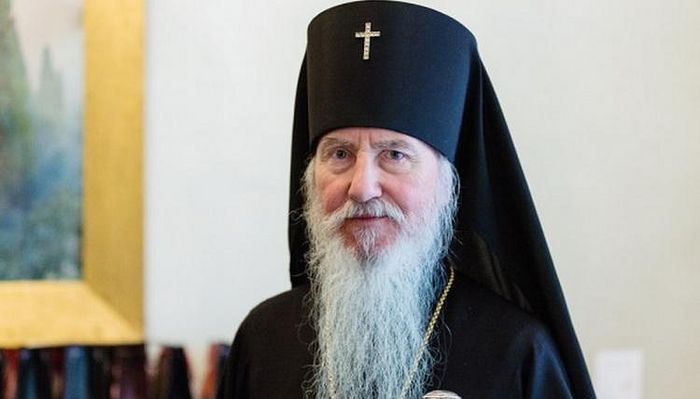
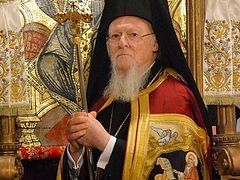
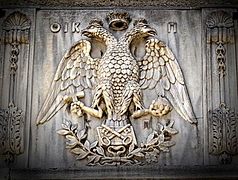
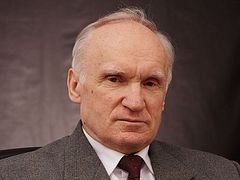
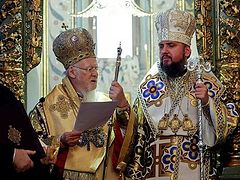
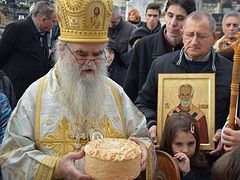
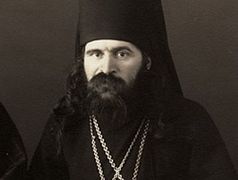
And no one is excluded from other's services. What Abp Mark said is that any extra activities will not be joined which means dialogue commissions with the RCs for example, etc. But ANYONE is allowed to visit any Church. The only "exception" being that the ROC/ROCOR/UOC will not receive communion from the EP nor allow them to in ROC churches. That's the only break of communion.